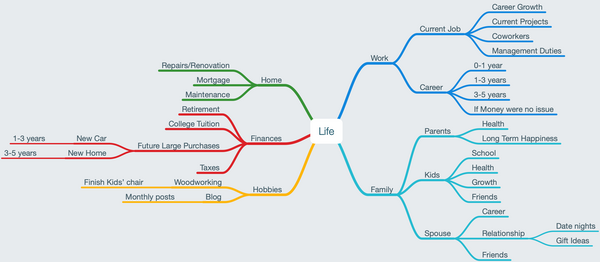
On Giving Advice
Published March 09, 2020 21:56
A friend of mine, Arvind, writes a blog called “myotherramblings.” It’s a place where he can write about anything he'd like to. Recently he wrote a post on [The Dark Side of Advice](https://myotherramblings.wordpress.com/2020/03/01/advice-a-dark-side/), I recommend you read it. I’ve often felt similarly, “if people aren’t going to do what I say, why did they ask me for advice!” This post got me thinking about another facet to giving advice. This post was originally an email directly to them, ...
A friend of mine, Arvind, writes a blog called “myotherramblings.” It’s a place where he can write about anything he’d like to. Recently he wrote a post on The Dark Side of Advice, I recommend you read it. I’ve often felt similarly, “if people aren’t going to do what I say, why did they ask me for advice!” This post got me thinking about another facet to giving advice. This post was originally an email directly to them, but I felt like it was helpful enough to post here. I fully understand the irony of giving unsolicited advice to a friend on a blog post about not wanting advice.
Here are some ideas around why you might be able to reframe advice and feedback for friends, coworkers, and family.
Many people problem solve out loud. Kind of like rubber duck debugging in programming it’s helpful to talk through your issues out loud. It’s especially helpful to talk to people who you trust or respect. From that perspective just being there and listening to somebody is helpful.
There’s a difference between venting and talking about a problem and asking for advice. In the first case it’s good to just let people run and sit back for the ride. The desire to jump in can be really powerful, but if it’s unwanted it can be off-putting, which may only further distance your friends.
If they do ask for advice or feedback, though, it’s important to do it in a gentle, constructive way. For example if I tell you about how I am having a hard time losing these last 10 pounds that I want to lose you can give some honest, and accurate feedback about how I’m an idiot for having lattes in the mornings and beers in the evening, but you won’t make me like listening to you.
In the case of advice and feedback you have to remember that you both have the same goals, to solve the problem. Pointing fingers or blame is rarely useful, even when correct. That can make somebody more reluctant to taking your advice. In the book Radical Candor that I recently read the author points out that in order to give good feedback you must first deeply care for that person and show that person that you care. Not with some false compliment sandwich BS, but with statements that show that you truly understand and care for them.
Finally, it’s possible that you’ve done all that and they still don’t do what you recommend, why’s that? Usually people have been thinking about this issue for a long time, and they’ve thought about many of the pros and cons, plusses and minuses, and options that you bring up. The scales are already tipping one way, and you’ve highlighted 10 things that are already on the scales. That doesn’t mean that your points are invalid, it just means that for the person, they value them differently.
More often than not, given all the same information we tend to balance our scales differently. Thank goodness for that. The world would be a very boring place if everybody made the same choices all the time!
Photo Credit: Filipe Almeida


